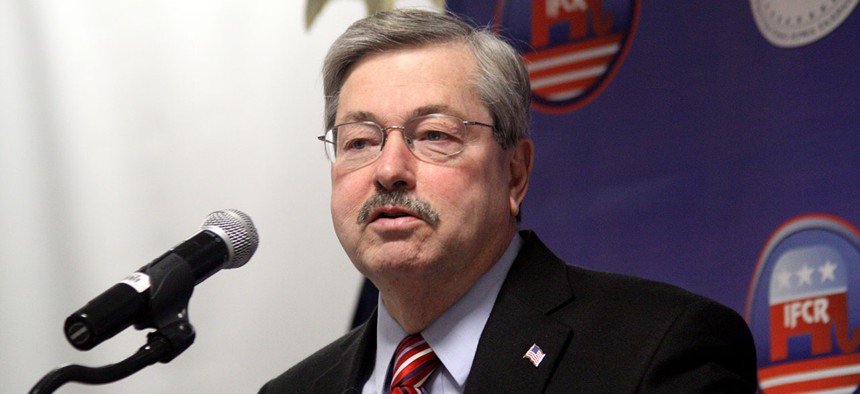
Flickr user Gage Skidmore
Trump Appoints a 'Long-time Friend' of Xi Jinping’s to Be the U.S. Ambassador to China
After a year of bashing China, Trump's appointed the governor or Iowa—an avowed fan of trade with China—as ambassador.
Donald Trump gives China a lot of grief on Twitter and at his rallies. But he also just gave the Middle Kingdom a lot of face.
Earlier today, Trump named Terry Branstad, the Republican governor of Iowa, as the next US ambassador to China. The announcement makes China the first country to which the president-elect has named an ambassador. The move is an indication of the importance the new administration attaches to US-China relations. Or, at least, it would be if it hadn’t come five days after Trump hopped on the phone for anunprecedented chat with the president of Taiwan (over which which the People’s Republic of China claims sovereignty).
Much is being made of Branstad’s claim that president Xi Jinping is a “long-time friend.” Probably too much.
It’s true that, responding to news of the appointment, the Chinese government spokesman called Branstad an “old friend” of China. However, that doesn’t necessarily mean the two are tight, says Scott Harold, associate director of Asia Policy at Rand.
“China is often portrayed as a place where relationships get you everything—that everything runs on guanxi (relationships),” he says. “But the Chinese Communist Party is very careful about not letting foreigners influence top Chinese leaders’ decisions…. Other than their having some familiarity with each other, I wouldn’t make too much of it.”
Plus, the two haven’t gotten the details of their bromance straight. Reports citing Branstad say the two first met in 1985, when Xi led an animal-feed delegation to Iowa. They have since spoken in person twice. However, a rigorously reported Wall Street Journal story from Xi’s perspective says the two first met in 1984, when Branstad visited a pig farming-heavy county in Hebei province where Xi served as Communist Party chief (paywall).
What they do have in common, however, is burgeoning agricultural trade between Iowa and China—something that Branstad has been instrumental in encouraging. (In fact, the governor just returned from an eight-day trade mission to China, his seventh.)
But that mutual appreciation puts Branstad at odds with Trump. One of the incoming president’s biggest campaign promises was to slap a 45% tariff on Chinese goods as punishment for currency manipulation. Branstad backs free trade, as well as a generally warmer approach to US-China relations. In fact, he’s openly differed with Trump on both.
“I know that Donald Trump thinks that the United States has not been very smart and not done a very good job in negotiating the trade deals and I’m sure that we can improve on that,” Branstad told IowaWatch in Jul. 2016. “But that should not mean that we reduce trade.”
As with so much about US politics these days, though, the symbolism probably outweighs those contradictions.
“The ‘friend of China’ as US Ambassador scenario is a comforting one for Beijing,” says Elizabeth Economy, Asia studies director for the Council on Foreign Relations. And after a year-plus of Trump’s China-bashing, this theme will be likely welcomed in Beijing.
“[I]n the eyes of the Chinese, this is perhaps the first indication that he has given them that he understands the importance of maintaining a positive overall relationship,” adds Economy.
That relationship may well need to weather far more taxing issues than currency manipulation—for instance, nuclear North Korea, China’s military buildup in the South China Sea, and escalating cyberwarfare, says Rand’s Harold. Let’s hope the bonds of trade and animal feed are made of tougher stuff.
(Image via Flickr user Gage Skidmore)






